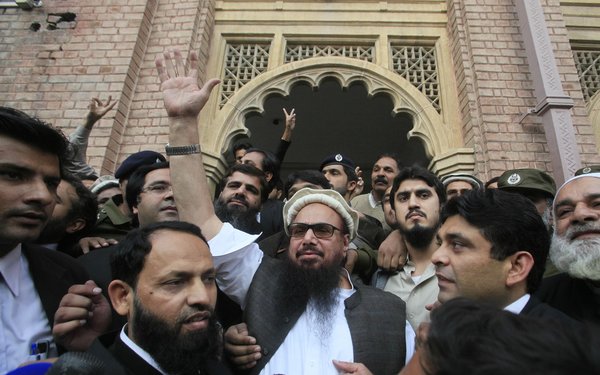News Analysis |
On Friday, the US urged Pakistan to re-arrest and charge the head of Lashkar-e-Taiba (LET), Hafiz Saeed for the heinous acts of violence he is accused of committing. Saeed is alleged to have masterminded the attacks of 26/11 in Mumbai.
Also, his outfit, the LET is accused of mounting attacks on India and stoking up violence in the Kashmir Valley. Saeed, a designated terrorist by the US Justice Department was released from house arrest on Wednesday when the court rejected the government’s plea of extending his house arrest by 60 days.
In a rare statement on Thanksgiving, the US State Department said:” “The Pakistani government should make sure that he is arrested and charged with his crimes.” The statement further added: “The United States is deeply concerned that Lashkar-e-Taiba leader Hafiz Saeed has been released from house arrest in Pakistan.”
The Indian media has reacted strongly to the release, terming it as an endorsement of India’s long-held assertions about Pakistan.
The State Department joined Delhi in strictly condemning the release of Saeed. Both countries share the view that Pakistan harbors terrorists on its soil. Despite Washington’s ratification of the Indian narrative on terrorism, Delhi is disconcerted with Washington’s soft approach on Pakistan and wants decisive action.
Read more: India fumes over release of Hafiz Saeed
Here it is noteworthy to mention that the US removed the condition of targeting LET for Pakistan to receive the restricted amount of $350 million under the Coalition Support Fund (CSF). India has often been puzzled by US’s dilly-dallying and many Indian commentators are cautious in reposing lofty expectations from the US.
The statement further said: “LET is a designated Foreign Terrorist Organization responsible for the death of hundreds of innocent civilians in terrorist attacks, including a number of American citizens”.
In May 2008, the US Treasury Department branded the LET chief a Specially Designated Global Terrorist. Later in December 2008, he was declared as an “Individual Terrorist” with both labels accusing him of the carnage in Mumbai that brought India and Pakistan on the cusp of war.
On Friday, the US urged Pakistan to re-arrest and charge the head of Lashkar-e-Taiba (LET), Hafiz Saeed for the heinous acts of violence he is accused of committing.
The State Department said that Saeed, his main organization, and their offshoots are under the Department of State and Treasury Department sanctions. Also, the US has kept a $10 million reward for bringing Saeed to justice. While some question the need to buckle under the US and Indian pressure when dealing with Saeed, some observers are certain that releasing Saeed is hurtful to Pakistan’s narrative of pulling the plug on terrorists.
Read more: Hafiz Saeed’s captivity: Has Pakistan’s Establishment finally realized its mistakes?
The Indian media has reacted strongly to the release, terming it as an endorsement of India’s long-held assertions about Pakistan. Defense analysts have gone as far as suggesting the military options should do something about Saeed.
The statement further said: “LET is a designated Foreign Terrorist Organization responsible for the death of hundreds of innocent civilians in terrorist attacks, including a number of American citizens”.
Experts have warned against taking this recourse. Regardless, Indo-Pak tensions are set to fester further due to the release of Saeed. Also, whatever ground was covered between the US and Pakistan, is likely to be lost as the US has ramped up its pressure on Pakistan to clamp down on Saeed and his associates. The question is whether Pakistan, as a sovereign country, can defy the orders of its courts just because of foreign pressure?














